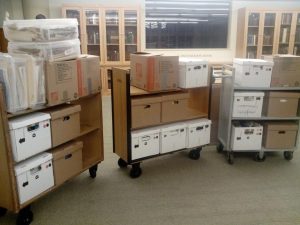 On June 30th Peter Rawson and I drove down to Potomac, MD to pick up a great gift to the Archives–several decades of the professional papers of Ben Bernard Barber ’65, who last year received the Alumni Achievement Award for his book Groundtruth: Work, Play and Conflict in the Third World (2014).
On June 30th Peter Rawson and I drove down to Potomac, MD to pick up a great gift to the Archives–several decades of the professional papers of Ben Bernard Barber ’65, who last year received the Alumni Achievement Award for his book Groundtruth: Work, Play and Conflict in the Third World (2014).
Ben came to Trinity from New York City, joining the fraternity QED, serving as the College’s delegate to the Connecticut Intercollegiate Student Legislature and on the staff of The Trinity Tripod, and was also involved with Hillel and the Political Science Club. He majored in French, and following graduation, his “gap year” turned into 15 years of traveling, writing poetry, and occasionally working as a carpenter throughout India, Asia, Europe, and the United States. He earned a master’s degree in journalism at Boston University, a certificate in French studies from the Sorbonne in Paris, and a certificate in Asian studies as a Gannett Fellow at the University of Hawaii.
He found work as a foreign correspondent for The Observer, USA Today, the Washington Times, and The Christian Science Monitor, among other publications, and later served as State Department bureau chief for the Washington Times and then as a senior writer for the U.S. Agency for International Development, where he reported from Afghanistan, Iraq, Pakistan, Yemen, and Egypt. He continues to write on foreign affairs today as a columnist for The Huffington Post and The American Legion Magazine.
Ben has also taught as an adjunct professor of foreign policy at Georgetown University and George Mason University, and has delivered lectures on foreign affairs at institutions such as the U.S. Naval Academy, the National Defense University, and Johns Hopkins University. For the U.S. Information Agency, he designed and taught seminars for journalists in 10 African countries, and has appeared as a foreign policy expert on several television networks, including CNN, Fox, and BBC.
 In 2014 he published Groundtruth: Work, Play and Conflict in the Third World, a collection of photographs and vignettes about the development of dozens of countries in the Third World, often portrayed in the media as a cliché for poverty, war, and injustice. “For every trouble-making gunman you find in the turbulent corners of the Third World,” he writes, “you find a million decent hardworking men and women raising their children with eyes full of sunshine and hope.”
In 2014 he published Groundtruth: Work, Play and Conflict in the Third World, a collection of photographs and vignettes about the development of dozens of countries in the Third World, often portrayed in the media as a cliché for poverty, war, and injustice. “For every trouble-making gunman you find in the turbulent corners of the Third World,” he writes, “you find a million decent hardworking men and women raising their children with eyes full of sunshine and hope.”
The archive documents his career as a journalist, and comprises electronic files, correspondence, photos, notes and press clippings. It will be processed and available for use by students, faculty and outside researchers as soon as possible.